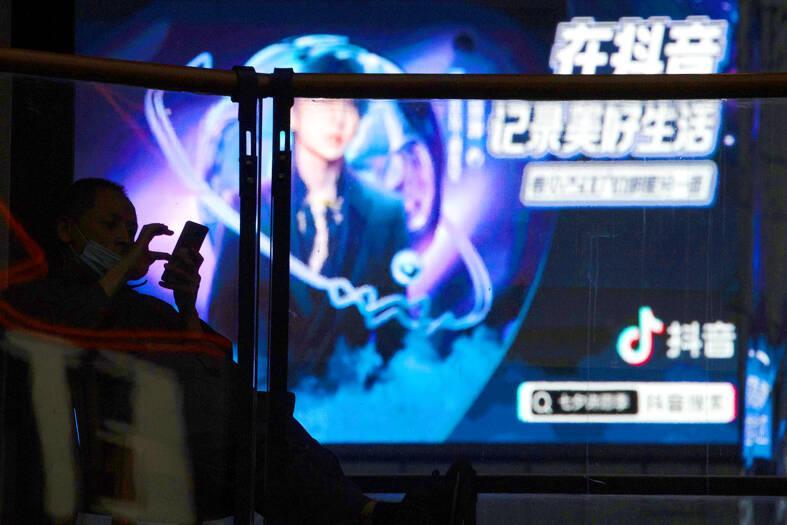Beijing could be using Douyin and TikTok (international) to sow distrust in the government and elections among young Taiwanese, experts said.
Short-form video-sharing platforms are the easiest way to influence the views of young Taiwanese, said a source familiar with cross-strait issues, commenting on the condition of anonymity.
The Chinese Communist Party (CCP) has repeatedly used Douyin to drum up support for specific presidential candidates leading up to Saturday’s election, the source said, adding that chronic use of Douyin could cause users to develop pro-China views.

Photo: AP
Douyin has shown that it can influence the decisions and perceptions of young people, Taiwan Thinktank researcher Wu Se-chih (吳瑟致) said.
Videos alleging that the Central Election Commission had engaged in ballot-rigging are trying to sow doubt in the government and, eventually, society as a whole, Wu said.
Such tactics aim to create conflict, heighten social turmoil and eventually give cause for the CCP to intervene, he said.
Young people have shown little responsibility in sharing questionable Douyin videos, a trend that should be closely monitored, he said.
National Chengchi University political science professor Hung Ching-fu (洪敬富) said that the CCP could be behind the videos claiming that ballot-rigging occurred.
Once people begin to doubt democracy, it would in the long term create discord, Hung said.
Dismissing Taiwan’s democracy as “worthless” would further prop up the legitimacy of China’s autocratic rule, he added.
Democratic Progressive Party (DPP) Legislator Wang Ting-yu (王定宇) called for measures to regulate Douyin, and potentially ban it.
Douyin, as a Chinese company, carries inherent security risks, and videos hosted on the platform are being used to spread misinformation, Wang said.
Users are unable to get a complete story on issues presented in videos due to length restrictions on Douyin, he said.
The issue should be a concern for all political parties, he said, urging lawmakers to work together to draft legislation to control Douyin, and, if the app proves to be uncontrollable, to ban it.

Three Taiwanese airlines have prohibited passengers from packing Bluetooth earbuds and their charger cases in checked luggage. EVA Air and Uni Air said that Bluetooth earbuds and charger cases are categorized as portable electronic devices, which should be switched off if they are placed in checked luggage based on international aviation safety regulations. They must not be in standby or sleep mode. However, as charging would continue when earbuds are placed in the charger cases, which would contravene international aviation regulations, their cases must be carried as hand luggage, they said. Tigerair Taiwan said that earbud charger cases are equipped

UNILATERAL MOVES: Officials have raised concerns that Beijing could try to exert economic control over Kinmen in a key development plan next year The Civil Aviation Administration (CAA) yesterday said that China has so far failed to provide any information about a new airport expected to open next year that is less than 10km from a Taiwanese airport, raising flight safety concerns. Xiamen Xiangan International Airport is only about 3km at its closest point from the islands in Kinmen County — the scene of on-off fighting during the Cold War — and construction work can be seen and heard clearly from the Taiwan side. In a written statement sent to Reuters, the CAA said that airports close to each other need detailed advanced

Tropical Storm Fung-Wong would likely strengthen into a typhoon later today as it continues moving westward across the Pacific before heading in Taiwan’s direction next week, the Central Weather Administration (CWA) said. As of 8am, Fung-Wong was about 2,190km east-southeast of Cape Oluanpi (鵝鑾鼻), Taiwan’s southernmost point, moving westward at 25kph and possibly accelerating to 31kph, CWA data showed. The tropical storm is currently over waters east of the Philippines and still far from Taiwan, CWA forecaster Tseng Chao-cheng (曾昭誠) said, adding that it could likely strengthen into a typhoon later in the day. It is forecast to reach the South China Sea

WEATHER Typhoon forming: CWA A tropical depression is expected to form into a typhoon as early as today, the Central Weather Administration (CWA) said yesterday, adding that the storm’s path remains uncertain. Before the weekend, it would move toward the Philippines, the agency said. Some time around Monday next week, it might reach a turning point, either veering north toward waters east of Taiwan or continuing westward across the Philippines, the CWA said. Meanwhile, the eye of Typhoon Kalmaegi was 1,310km south-southeast of Oluanpi (鵝鑾鼻), Taiwan’s southernmost point, as of 2am yesterday, it said. The storm is forecast to move through central